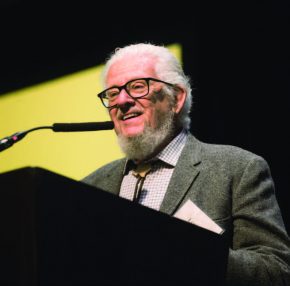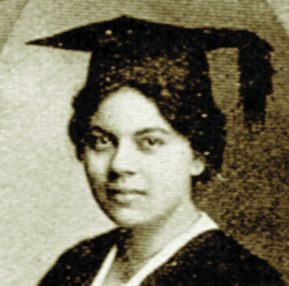Alva Ellisor and Lynton Land Join Elite Group of Geoscientists
December 5, 2018


The Jackson School inducted a pioneering petroleum geologist and a distinguished academic scientist into its Hall of Distinction this year when it welcomed Alva Ellisor and Lynton Land to the group.
Ellisor was a pioneer in the petroleum industry who made a major technical breakthrough in 1921 when she discovered and proved that foraminiferal micropaleontology could be reliably used to correlate geological units in the Texas Gulf Coast. Her work and collaboration with two other female paleontologists, Esther Applin and Hedwig Kniker, led to the discovery of valuable new oil fields, created oil industry jobs for micropaleontologists, and gave rise to micropaleontology courses in 31 geology departments. By 1931, 75 percent of all oil wells drilled and completed in the country were using micropaleontology. This new technology had a profound impact. Prior to that, there was no reliable way to correlate strata other than fragments of macrofossils found in cuttings—the dogma of the day was that one-celled animals could not provide the diversity andrapid change through time to be effective.
Ellisor is a University of Texas alumna. She graduated with high honors in 1915 and taught at UT afterward for two years. She started working for Humble Oil in 1920 when Walter Pratt hired her for its paleontological laboratory to examine megascopic fossils, and her discovery revolutionized the industry. In 1927, she became Humble’s first research stratigrapher and paleontologist and worked
there until her retirement in 1947. She became a fellow of the Geological Society of America in 1929, and in 1962 received the Distinguished Alumni Award from the Geology Department of The University of Texas at Austin. She is a founding member of the Houston Geological Society. After a life devoted to stratigraphic research, and marked by numerous publications on most phases of Cretaceous and Tertiary stratigraphy and paleontology of the American Gulf Coast, she passed away in 1964 at the age of 72.
Land is a distinguished scientist who spent his entire academic career at the University of Texas Department of Geological Sciences, bringing worldwide recognition to our program in sedimentary geology and geochemistry. Lynton made major contributions to the study of
diagenesis of sedimentary rocks, especially burial diagenesis in the Gulf of Mexico sedimentary basin. This research has important implications for petroleum reservoirs, and his work was funded and closely followed by major oil companies. He was also the principal investigator of numerous NSF grants throughout his career.
Lynton’s work has been cited 5,374 times and, as of 1996, Lynton had supervised 19 master’s and 21 doctoral students, including two future presidents of the Society for Sedimentary Geology (SEPM) (Kitty Milliken and Dave Budd). He was an excellent teacher and won the Knebel Teaching Award in 1979. He worked closely with his colleagues (and Hall of Distinction members) Earle McBride and the late Robert Folk
and, making the department the place to study sedimentary petrology and geochemistry.
In 1996, Land received the SEPM Pettijohn Medal in recognition of his continued contributions to carbonate sedimentology and geochemistry, diagenesis of siliciclastics, and origin of dolomite and saline formation waters; his inspiring teaching skills, and his
international stature and leadership in sedimentary geology. Land is now a professor emeritus in the Department of Geological Sciences. In retirement, Land uses his scientific expertise to help society. As he states on his Jackson School web page, “Since retiring to Northumberland County in tidewater Virginia, I have tried to use my scientific knowledge to educate citizens and local and state
government officials about critical [environmental] issues for the future.”
The Jackson School’s Hall of Distinction was founded in 1980 and currently has 38 members, including this year’s new inductees. To see a
full listing of honorees, visit www. jsg.utexas.edu and type “Hall of Distinction” in the search field.
